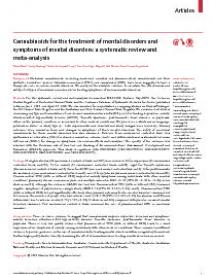Cannabinoids for the treatment of mental disorders and symptoms of mental disorders : a systematic review and meta-analysis
Background: Medicinal cannabinoids, including medicinal cannabis and pharmaceutical cannabinoids and their synthetic derivatives, such as tetrahydrocannabinol (THC) and cannabidiol (CBD), have been suggested to have a therapeutic role in certain mental disorders. We analysed the available evidence to ascertain the effectiveness and safety of all types of medicinal cannabinoids in treating symptoms of various mental disorders.
Methods: For this systematic review and meta-analysis we searched MEDLINE, Embase, PsycINFO, the Cochrane Central Register of Controlled Clinical Trials, and the Cochrane Database of Systematic Reviews for studies published between Jan 1, 1980, and April 30, 2018. We also searched for unpublished or ongoing studies on ClinicalTrials.gov, the EU Clinical Trials Register, and the Australian and New Zealand Clinical Trials Registry. We considered all studies
examining any type and formulation of a medicinal cannabinoid in adults (≥18 years) for treating depression, anxiety, attention-deficit hyperactivity disorder (ADHD), Tourette syndrome, post-traumatic stress disorder, or psychosis, either as the primary condition or secondary to other medical conditions. We placed no restrictions on language, publication status, or study type (ie, both experimental and observational study designs were included). Primary outcomes were remission from and changes in symptoms of these mental disorders. The safety of medicinal cannabinoids for these mental disorders was also examined. Evidence from randomised controlled trials was synthesised as odds ratios (ORs) for disorder remission, adverse events, and withdrawals and as tandardised mean differences (SMDs) for change in symptoms, via random-effects meta-analyses. The quality of the evidence was assessed with the Cochrane risk of bias tool and Grading of Recommendations, Assessment, Development and Evaluation (GRADE) approach. This study is registered with PROSPERO (CRD42017059372, CRD42017059373, CRD42017059376, CRD42017064996, and CRD42018102977).
Findings 83 eligible studies (40 randomised controlled trials, n=3067) were included: 42 for depression (23 randomised controlled trials; n=2551), 31 for anxiety (17 randomised controlled trials; n=605), eight for Tourette syndrome (two randomised controlled trials; n=36), three for ADHD (one randomised controlled trial; n=30), 12 for post-traumatic stress disorder (one randomised controlled trial; n=10), and 11 for psychosis (six randomised controlled trials; n=281).
Pharmaceutical THC (with or without CBD) improved anxiety symptoms among individuals with other medical conditions (primarily chronic non-cancer pain and multiple sclerosis; SMD –0·25 [95% CI –0·49 to –0·01]; seven studies; n=252), although the evidence GRADE was very low. Pharmaceutical THC (with or without CBD) worsened negative symptoms of psychosis in a single study (SMD 0·36 [95% CI 0·10 to 0·62]; n=24). Pharmaceutical THC (with or without CBD) did not significantly affect any other primary outcomes for the mental disorders examined but did increase the number of people who had adverse events (OR 1·99 [95% CI 1·20 to 3·29]; ten studies; n=1495) and withdrawals due to adverse events (2·78 [1·59 to 4·86]; 11 studies; n=1621) compared with placebo across all mental disorders examined. Few randomised controlled trials examined the role of pharmaceutical CBD or medicinal cannabis.
Interpretation: There is scarce evidence to suggest that cannabinoids improve depressive disorders and symptoms, anxiety disorders, attention-deficit hyperactivity disorder, Tourette syndrome, post-traumatic stress disorder, or psychosis. There is very low quality evidence that pharmaceutical THC (with or without CBD) leads to a small improvement in symptoms of anxiety among individuals with other medical conditions. There remains insufficient evidence to provide guidance on the use of cannabinoids for treating mental disorders within a regulatory framework. Further high-quality studies directly examining the effect of cannabinoids on treating mental disorders are needed.
Funding: Therapeutic Goods Administration, Australia; Commonwealth Department of Health, Australia; Australian National Health and Medical Research Council; and US National Institutes of Health.
Geachte bezoeker,
De informatie die u nu opvraagt, kan door psychotraumanet niet aan u worden getoond. Dit kan verschillende redenen hebben,
waarvan (bescherming van het) auteursrecht de meeste voorkomende is. Wanneer het mogelijk is om u door te verwijzen naar de bron
van deze informatie, dan ziet u hier onder een link naar die plek.
Als er geen link staat, kunt u contact opnemen met de bibliotheek,
die u verder op weg kan helpen.
Met vriendelijke groet,
Het psychotraumanet-team.
In: The Lancet: Psychiatry ISSN: 2215-0366 | oktober
https://www.thelancet.com/journals/lanpsy/article/PIIS2215-0366(19)30401-8/fulltext
Online verschenen 28/10/2019


